In a matter of weeks, Animesh Namjoshi, 24, plans to graduate with a degree in economics from the University of Texas at Austin.
For most students, it’s an exciting time. But for Namjoshi — and thousands of others — it could mean being forced to leave the country.
“Graduation means that my time is running out, ironically, so it’s definitely not a happy thing,” said Namjoshi, whose student visa will expire after he graduates.
Despite his family immigrating to the United States following a strict legal pathway, Namjoshi said he’s still facing an uncertain future.
He’s one of thousands who have already aged out of their parent’s work visa protections. Known as “documented Dreamers,” people who came to the U.S. legally as kids but who now may be forced to self-deport.
The issue springs from the growing green card backlog for Indian families who come here on work visas. Hundreds of thousands of kids of high-skilled workers could age out of visa protections in the coming years.

Animesh Namjoshi, center right, celebrates Diwali with his father, Jayant, mother, Sarita, and brother Aditya.
His other option is graduate school, to stay on another student visa. If he doesn’t find a visa, he’ll have to leave the U.S. and be separated from his parents.
“The U.S. is the country that I’ve known the longest and yet I’m in danger of having to leave,” Namjoshi said.
The advocacy group Improve the Dream estimates more than 200,000 children of legally present immigrant workers are at risk of aging out of green card eligibility, like Namjoshi.
Improve the Dream founder Dip Patel, who himself aged out of his parent’s visa protections, is pushing legislation that will offer this group a path to citizenship.
“There’s been some good successes and the biggest one was earlier this year when some documented Dreamers were included in the House version of the Dream and Promise Act,” Patel said.
That legislation would also create a permanent fix for undocumented Dreamers — people who were brought to the United States as children, but don’t have immigration status. Patel sees solidarity between the two groups.
“I don’t see us as being different,” Patel said. “Any child who grew up here, whether it was with a documented status or an undocumented status, deserves to stay.”
He said he’s hopeful about the Dreamer bill and the newly introduced bipartisan bill America’s Children Act, which would create a permanent solution for current and future documented Dreamers by creating a path to citizenship.
A class-action lawsuit filed by an Oregon-based attorney is also challenging visa protocols. The lawsuit, first filed in 2019, claims the process is discriminatory against Indians who age out of the backlog.
Despite the recent setback for undocumented Dreamers and knowing how tough it is for Congress to pass immigration reform, Patel said he’s not discouraged.
“The next six-to-12 months are probably the most hopeful that I think I’ve been, because it seems like there are multiple avenues that are possible,” he said.
But both the legislation and the legal challenge are in early stages, leaving documented Dreamers — like Animesh Namjoshi — in limbo.
For now, Namjoshi said he’s hoping to go to graduate school to buy him a little more time. He added that if this issue isn’t solved within the next decade his younger brother will face a similar fate.
“We hear a lot of news about family separation at the border,” Namjoshi said. “It also happens to us.”














